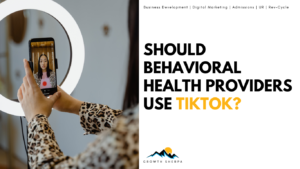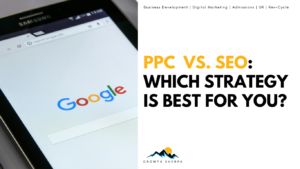As a private practice therapist, counselor, psychologist, or psychiatrist, you’re in the unique position of offering deeply personal services to individuals in need. Whether you focus on mental health, addiction recovery, or general counseling, your expertise can truly change lives. However, no matter how skilled you are, if potential clients don’t know you exist, you can’t help them. This is where digital marketing comes
In today’s increasingly digital world, having an online presence is critical for growing your practice. The good news? You don’t need a huge marketing budget to get started. By taking a few strategic steps, you can begin to attract clients, build a referral network, and develop your brand online.
In this guide, we’ll walk through how solo therapists and private practices can get started with digital marketing, connect with behavioral health and addiction treatment providers for referrals, and why partnering with the right marketing agency can fast-track your success.
Step 1: Build a Professional Website
Your website is the foundation of your digital marketing efforts. It’s where potential clients will go to learn about your services, see your credentials, and decide whether to book an appointment. If you don’t yet have a website, or if your current one feels outdated, now is the time to invest in it.
Here’s what you’ll need to create an effective website:
- Simple Navigation: Make it easy for visitors to find essential information, such as services, fees, credentials, and contact details.
- Clear Service Offerings: Clearly explain the types of therapy or counseling you provide. Be specific — list whether you specialize in anxiety, depression, couples counseling, addiction, trauma, etc.
- Online Scheduling and Contact Forms: Make it convenient for prospective clients to book an appointment or reach out to you. Online scheduling software or a simple contact form can help you capture leads.
- About Page with Your Story: Clients want to feel connected before their first session. Include a detailed “About” page with your qualifications, background, and philosophy on therapy.
- SEO (Search Engine Optimization): Ensure your website is optimized for search engines. Use keywords like “therapist near me,” “mental health counselor,” or “psychologist for anxiety” to help your site rank higher when people search for services in your area.
Step 2: Establish Your Online Presence with Local SEO
Local SEO is a powerful tool for solo practitioners. Most people searching for mental health services want someone local, so focusing on local SEO strategies will help your practice appear in search results for people in your geographic area.
To improve your local SEO:
- Create a Google My Business (GMB) profile: This is free and essential for showing up in local search results. Make sure your GMB profile is fully filled out with your services, office hours, contact information, and location.
- Encourage reviews: Ask satisfied clients to leave you a review on Google. Positive reviews build trust and boost your local SEO ranking.
- Use location-based keywords: In your website copy, mention the cities or neighborhoods you serve. For example, “Providing therapy to clients in [City], [Neighborhood], and surrounding areas.”
By focusing on local SEO, your practice will show up when people in your area search for a therapist, psychologist, or counselor.
Step 3: Leverage Social Media for Connection and Awareness
Social media can feel overwhelming for solo practitioners, but it’s an excellent way to engage with potential clients and build your brand. You don’t need to be active on every platform. Focus on one or two that resonate most with your audience.
Which platforms to choose?
- Instagram: Great for sharing insights on mental health, therapy tips, and motivational content. Instagram is ideal for connecting with individuals who may be hesitant about therapy but are exploring their options.
- Facebook: Useful for connecting with local community groups or professional networks. You can also create a Facebook business page where clients can learn more about your services.
- LinkedIn: Ideal if you want to connect with other healthcare professionals, behavioral health organizations, or potential referral partners.
Content ideas for social media:
- Share short articles or blog posts on mental health topics.
- Post testimonials (with client permission) or success stories.
- Provide tips or coping strategies for managing stress, anxiety, or addiction recovery.
- Highlight your expertise with video content that explains your approach to therapy.
Consistency is key. You don’t need to post every day, but aim to post regularly to build awareness and establish your voice as a trusted mental health professional.
Step 4: Start Blogging to Build Authority and SEO
A blog can serve as a valuable resource for potential clients while also improving your website’s SEO. By consistently posting informative, engaging, and keyword-optimized content, you’ll increase the likelihood of your website ranking higher in search results
Here are a few blog post ideas:
- “How to Know When It’s Time to See a Therapist”
- “5 Effective Strategies for Managing Anxiety”
- “The Connection Between Mental Health and Addiction”
- “What to Expect During Your First Therapy Session”
Each blog post should address a common question or concern that potential clients may have. Use keywords strategically within your posts to ensure they align with what people are searching for online. This approach can drive more traffic to your site and establish you as an expert in your field.
Step 5: Connect with Behavioral Health and Addiction Treatment Providers for Referrals
Referral relationships are critical for solo therapists and counselors. One of the best ways to grow your client base is by building strong partnerships with behavioral health and addiction treatment providers. These organizations frequently need trusted therapists to refer their clients to after they complete treatment or require ongoing support.
How to connect with referral sources:
- Attend local behavioral health events and networking opportunities. Many treatment centers and mental health facilities host community events or continuing education programs for professionals.
- Reach out directly. Send a professional email or call nearby behavioral health centers, addiction treatment facilities, or psychiatrists to introduce yourself and express your interest in becoming a referral partner.
- Offer value upfront. Consider offering a free consultation to help facilities understand the types of clients you serve and how your practice can support their patients in the long term.
Establishing these relationships can provide a steady stream of clients and allow you to contribute to the continuum of care for individuals recovering from addiction or managing ongoing mental health conditions.
Step 6: Invest in PPC and Paid Social Media Advertising
Once your website is up and running, and you’ve established a social media presence, you can begin exploring paid advertising options like Pay-Per-Click (PPC) and paid social media ads. These can help you reach clients faster than organic strategies alone.
- PPC (Google Ads): You can create targeted ads that show up when potential clients search for specific services, such as “therapist for anxiety” or “psychologist for depression in [city].”
- Paid Social Media Ads: Platforms like Facebook and Instagram allow you to target your ads based on location, interests, and even life events. For example, you could create ads that target people who recently searched for “mental health help” or “addiction recovery.”
These tools help you put your services in front of the right audience and can lead to an increase in consultations and bookings.
Step 7: Partner with the Right Agency to Maximize Growth
While it’s possible to get started with digital marketing on your own, working with an agency that specializes in behavioral health can significantly accelerate your growth. As a solo therapist or private practice owner, you’re already juggling patient care, administration, and the responsibilities of running a business. The right marketing agency can take the guesswork out of digital marketing, allowing you to focus on what matters most — your clients.
At Growth Sherpa, we specialize in helping solo practitioners, therapists, and behavioral health providers build a strong online presence. We understand the unique challenges that come with marketing mental health and addiction recovery services, and we’re experienced in navigating the specific regulations and sensitivities required in this industry.
How Growth Sherpa Can Help:
- Customized digital marketing strategies tailored to your practice’s needs, whether you’re just starting or looking to expand.
- SEO services to help your website rank higher in search results, ensuring you attract the right clients.
- PPC and paid social media advertising campaigns to quickly drive high-quality leads to your practice.
- Website optimization and design services to ensure your site is not only beautiful but also functional and easy to navigate.
- Content marketing and blog creation to establish your authority in the mental health space.
By partnering with Growth Sherpa, you’ll have access to a team of marketing professionals who understand your industry, allowing you to focus on growing your practice without worrying about the complexities of digital marketing.




